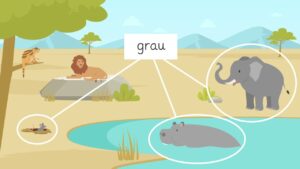German Poetry: Pine Trees, Palm Trees, and Love
In einem Tal bei armen Hirten
Erschien mit jedem jungen Jahr,
Sobald die ersten Lerchen schwirrten,
Ein Mädchen, schön und wunderbar (Friedrich Schiller)
What Does Poetry Do to Us?
Do you know a key sign, or rather two signs, you’re becoming good at a foreign language? The first one is you start having dreams in that language. The second one is you start enjoying poetry written in the target language. If you have been learning German for some time now, it might be a great time to stop with the English translation of deutsche Gedichte and dive deeper into German culture and its aesthetics. Die Poesie is a part of German literature that loses the most when translated: one just cannot convey the complex symbolism and rhyme scheme using another linguistic system.
It’s also a great exercise to learn deutsche Gedichte by heart and recite them. This practice improves pronunciation, fluency, and intonation. Then again, reading poetry in the evening gives you a sense of relaxation, sets you in a romantic mood, and lets you relieve stress after a hard day.
If you have been wondering what poets you should check first, google no more. Our German native instructor Birgit and her fun American student Alex are opening the magic box of quality Poesie in this article.
The German Poets You Cannot Miss
- “Wie herrlich leuchtet mir die Natur“…
- “Wie glänzt die Sonne! Wie lacht die Flur!”
- Alex!
- Yes, Birgit?
- You know this poem by Johann Wolfgang von Goethe!
- Well, just this one.
- Still, I'm impressed. How come I’ve never known you are a fan?
- That’s my secret flirting trick.
- You never mentioned that during our pick-up lines lesson.
- I'm doing it now.
- Doing what? Flirting with me?
- Kinda. I was saving it for a wow effect.
- You've got it!
- Look at me! Getting these comments from Ms. Strictest Teacher Ever.
- Yeah, you can be proud of yourself. Tell me you know other German poets, and I’m tickled pink.
- Easy peasy lemon squeezy:
- Today feels like my birthday. You’re doing all the work for me.
- What can I say...? I’m a lyric poetry guy.
- And you’ve been keeping that a secret!
- I was a bit ashamed of this romantic addiction.
- No way! It’s so vogue. Check these guys as well, by the way:
- Wait-wait, isn’t Kästner the guy who wrote Emil und die Detektive, a children’s book you mentioned during the lesson on German books?
- He is! Have you been taking some magic memory pills?
- Magic pills? I brought some from my trip to Amsterdam, but that's a secret.
- Sure you did. Gonna impress me even more and name Hesse’s non-poetic work too?
- You won’t believe it! I’ve just finished reading this one - Wenn der Krieg noch zwei Jahre dauert.
- I think my student Alex is broken... Zwick mich.
- Z-what dich?
- Ich glaub‘, ich träum’…Pinch me.
- Weird dreams you have. But well, here you go.
- Ouch.
FAQ: How do you say poem in German?
In German, you use words such as 'Gedicht (das)', 'Dichtung (die)', 'Poesie (die)', und 'Lyrik' (die).
What Are German Language Poems About?
- Well, Herr Connoisseur, tell me what German poems are about.
- Uhm… Love... death... and... robots?
- Alex!
- Well, they're about life, summer, heaven, sunshine, loneliness, and lollipops! You don't have to be a genius to know this.
- Heh, a good point. Let’s just look at a few examples and…
- …and pick one for me to learn by heart?
- Were those also read-people’s-mind pills you took?
- You tell me. Did they work?
- Not quite. You’ll be learning two selected pieces, not one.
- Of course I will.
- As they say, learning German is like drinking a well-aged wine at a cool spot.
- Who's "they"?
- Um… I am.
- Indeed. I can imagine drinking some good wine by a lake in Switzerland. Summer, sun, colorful flowers, a pretty girl with golden curls by my side...
- Are we still here, or are we by the lake?
- You're here, I'm at the lake.
FAQ: Who is the most famous German poet?
Johann Wolfgang von Goethe (1749-1932) is considered the most prominent German poet, playwright, and literary figure in German history. There is hardly anyone who has not heard about Faust, Goethe's character of the same-name play, who sold his soul to the Devil in exchange for knowledge and power.
Heine’s Love Theme
- Should we start with my favorite poem? It’s Heinrich Heine’s “Ein Fichtenbaum steht einsam”:
Ein Fichtenbaum steht einsam
Im Norden auf kahler Höh'.
Ihn schläfert; mit weißer Decke
Umhüllen ihn Eis und Schnee.
Er träumt von einer Palme,
Die, fern im Morgenland,
Einsam und schweigend trauert
Auf brennender Felsenwand.
- I like Heinrich Heine, but what’s so special about this poem?
- It has two strong symbols – a pine tree (der Fichtenbaum) and a palm tree (die Palme). The image created in the poem is that of the distance between them. They long for each other.
- So that’s a love poem?
- Kind of: Heine blends love and nature in a very interesting way. What's unique about this verse is that it's almost untranslatable although it has loads of translated versions. Guess why?
- Just cuz?
- No! It has to do with grammar trouble.
- That's the worst kind of trouble!
- We’ve covered that aspect already.
- I'm not going to guess, Birgit.
- Okay okay, I’m telling it – articles.
- Articles?
- In German, the pine tree is a "he" (der) and the palm tree is a "she" (die), which creates a strong image of a man and a woman longing for each other.
- Oh. That's both cute and a bit naughty.
- You cannot render this story effectively in Engish, which lacks gender-specific articles. It becomes even more difficult in other languages, where these trees may both be either masculine or feminine.
- …turning a straight tree couple into a gay one? An interesting poetic twist.
- A sharp comment. Typical Alex.
- Still got it.
Goethe and a Gloomy Forest
- My turn, Birgit. Let’s talk about my favorite poem now.
- Sure. Which one is it?
- “Erlkönig” by Goethe. "Mein Sohn, was birgst du so bang dein Gesicht?“
- "Siehst, Vater, du den Erlkönig nicht?" A surprising choice. I thought you’d pick a short poem, an erotic verse, like Bochert’s “Der Kuss”.
- Well, I can think about something else.
- So you say. “Erlkönig” is perhaps the most well-known ballad by Goethe. It was even set to music to sound like a song.
- By Schubert, right?
- You know everything. I'm feeling useless today.
- This lesson is my moment of glory.
- Right, Klaus Meine!
- Feel more like Rudolf Schenker.
- Whatever makes you happy, my friend. By the way, “Erlkönig” has been turned into performances and other works owing to its popularity. This here, for instance, is a nice recitation of the poem along with an animated scene in the woods:
Example #1 – “Erlkönig” by Goethe

Mein Sohn, was birgst du so bang dein Gesicht? 00:36 - 00:40
- "Mein Sohn"... That's so powerful. And this winter scene...
- Gives me goosebumps. What meaning does the poem have for you personally?
- Well, it’s gloomy and confusing at the first read. But it has two strong messages. The first is that supernatural powers influence human beings – we should respect and fear nature. The second is that one needs to learn how to build a trustful relationship with the children – had the father believed his son that a creepy creature was trying to seize him, the youth wouldn't have died.
- A great analysis, Alex. Nature is the central figure in loads of German poems, as you might have noticed. While this one is about winter, many poems focus on summer and spring.
- I guess you’ve got nothing left other than writing about nice weather in Germany.
- True. We see too little sun and light, even in summer.
Kästner's Longing for Spring
- My turn?
- Yes.
- As we’ve touched upon the scarcity of sun in Germany, I’d propose “Der April” by Erich Kästner.
Der Regen klimpert mit einem Finger
die grüne Ostermelodie.…
- It sounds like music.
- It does! This April verse is truly rhythmic. What’s interesting, Kästner has a piece for every month of the year 1955: Der Januar, Der Februar, etc.
- What a fancy naming strategy.
- I guess the man used up all the creativity for the content.
- I’ll need to check that.
- Please do. You’ll love every poem of his for sure. I’d also recommend reading up on this great man and his lifestyle or at least watching this brief retro video. Kästner himself describes his apartment and confesses how fantastic it is to bond with the environment: “Ich lebe zum ersten Male in einer Wohnung, von der aus man einen Blick in die Natur hat”.
Example #2 – Life of Erich Kästner

Rainer Maria Rilke and Sehnsucht
- Birgit, is it even fair we haven’t covered Rilke yet? He too has a poem about April.
- Most Germans do.
- But Rilke is indeed a genius!
- He is. His reflections upon the human suffering and pains of the soul are so deep. Do you have a favorite poem?
- Well, all of them. But “Das ist die Sehnsucht” is the one that comes to my mind right now:
Das ist die Sehnsucht: wohnen im Gewoge
und keine Heimat haben in der Zeit.
Und das sind Wünsche: leise Dialoge
täglicher Stunden mit der Ewigkeit.
Und das ist Leben. Bis aus einem Gestern
die einsamste von allen Stunden steigt,
die, anders lächelnd als die andern Schwestern,
dem Ewigen entgegenschweigt.
- Sehnsucht…
- Yeah, the word you list among the pretty German words which have no English translation.
- Isn’t it beautiful?
- It is a dense and descriptive term for sure.
- And beautiful?
- Not more than any other German word I cannot pronounce adequately.
- Negative comments again.
- It's not a negative comment. Meine Aussprache ist schlecht.
- You’re reciting poems by Rilke! Stop criticizing your German, um Gottes Willen!
- Ich bin einfach extrem schüchtern.
- No need to be shy.
How to Learn Grammar with German Poems
- Fortunately, I don’t have to persuade you to read the original – you’re already doing this. I’ve missed my whiny Alex today.
- Wait till the next grammar lesson – and he’ll be back.
- Heh, right. Now that you mention grammar…
- Ouch, why did I mention it…
- Poems are a great way to work on grammar.
- Hmm…
- Sign of disbelief?
- Just curiosity. How's that?
- Well, let’s take "An meine kleine Freundin" by Georg Heym as an example:
Wer hätte das gedacht
Das kam wohl über Nacht.
Denn als ich aufgewacht,Da warst auf einmal du
Mein kleiner Herztyrann.
Sieh doch mal einer an,
Was Amor alles kann.Schon weiß ich, was ich tu,
Damit du gnädig bist,
Und mich nicht gleich vergißt:
Ich mach dir dies Gedicht.
Ich hoff; es ist so schlicht,
So süß und zart wie du.
- I see you’re into love verses, Birgit.
- Aren't all of them about love, more or less?
- I guess.
- Nevertheless, this poem has got pretty much everything we’ve covered grammar-wise:
- possessive pronouns (e.g., meine; mein)
- adjectives and their inflections (e.g., kleine Freundin; kleiner Herztyrann; schlicht)
- subjunctive mood (e.g., wer hätte das gedacht)
- verb conjugation (e.g., warst du; weiß ich)
- Why are you taking poetry away from me?
- Am I?
- Now I'll be thinking about articles and adjectives when reading Goethe.
- Nothing bad about that.
- There's a thing or two bad about that.
- You can also read the same poem once again, this time for a deeper analysis and new words, as suggested here. The woman uses “Loreley” by Heinrich Heine:
Example #3 – Analyzing “Die Loreley”

Ich weiß nicht, was soll es bedeuten. 02:00- 02:04
FAQ: What type of poem is to Germany?
"To Germany" is a sonnet written by Charles Hamilton Sorley. The poet uses a plethora of short, sharp words consisting of just a few letters (rain, pain, firm) to convey the suffering in the world war. The poem tells a story about the death of a young soldier, who hoped for peace without really believing it was possible.
To Read or Not to Read
German culture is rich and multifaceted. You don’t want to lose its subtlety and music while reading literature in translation only. Once you’ve committed to learning the language, take another step and look behind the curtain. There, you'll find the truly flowery sound of German poetry, intriguing metaphors, and vivid imagery that you can't access in translation.
Poetry gives you a chance to dream, cry, and love in German. When reading it regularly, you'll develop an authentic feel for German and you'll experience how beautiful this language is beneath everyday oral speech and even written fiction. Do you agree?
Example #4 – Do Poems Inspire?

Ich schrieb es nicht. 00:49 - 00:51
Even Alex, a very sarcastic and pragmatic young man, appreciates German poets. Do you? Join him and Birgit for upcoming discussions, resource suggestions, and other materials on Flying Languages.






